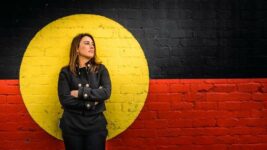Thorpe Condemns Torture Treaty Delay in Harming First Nations and Elderly

Senator Lidia Thorpe raised “torture in Australia” with Attorney General Department deputy secretary Sarah Chidgey during a 22 February Senate Estimates hearing, querying why our nation missed its obligation to implement a UN treaty that aims to prevent this ongoing issue.
The Greens senator was referring to the 20 January 2022 deadline to implement the OPCAT, which obligates a nation to establish a UN-governed system of independent inspections to monitor closed environments, like prisons and detention centres, to prevent human rights abuses.
Thorpe pointed out to Chidgey that Morrison’s hand-picked Human Rights commissioner Lorraine Finlay has put this major discrepancy down to “the need for additional funding and the lack of an overarching national framework for implementation”.
Missing deadlines after ratifying international treaties isn’t a good look. But, not to worry, as Chidgey advises that her boss, Michaelia Cash, wrote to the treaty governing body in December asking for a year extension, and she also discussed “implementation” at the last meeting of attorneys general.
Keeping up appearances isn’t the main concern, however, as OPCAT prevents abuse in places where people are deprived of their liberty and these transgressions will continue until implementation. And in Australia, ongoing delays mean significant harm to First Nations people overrepresented inside.
A stark statement
“The Morrison government has shown us that Blak lives do not matter in this country,” said Thorpe, a Gunnai Gunditjmara and Djab Wurrung woman.
“This government failed to implement OPCAT in time because obviously they do not prioritise ensuring that all imprisoned people, particularly First Nations people, can have their basic human rights and dignities protected in all closed settings and institutions,” the senator added.
The latest ABS custody figures from last September reveal that 30 percent of the national adult prisoner population consists of First Nations people, however Aboriginal and Torres Strait Islander people make up less than 3 percent of the overall populace of the settler colonial nation of Australia.
Not only would OPCAT implementation improve conditions First Nations inmates are subjected to in places of detention, but it would have the potential to prevent deaths in custody.
At present, over 490 Indigenous individuals have lost their lives in the custody of Australian police or corrective services since 1991: the year the Royal Commission into Aboriginal Deaths in Custody delivered its 339 recommendations, which have largely been ignored.
This death toll has been rising dramatically over the last 12 months.
“Any government that fails this basic test of decency or fails to live up to our commitments under international law,” Thorpe further told Sydney Criminal Lawyers, “has failed all of us.”
A preventive mechanism
The OPCAT (Optional Protocol to the Convention Against Torture) was adopted by the UN General Assembly in 2002, and, as its name suggests, it complements the 1984 Convention on Torture.
The Australian government became a signatory to the treaty in 2009, and it then rolled over and went back to sleep.
It wasn’t until the 2016 fallout over the abuse of First Nations youth at the Northern Territory’s Don Dale child prison that then attorney general George Brandis ratified the OPCAT in December 2017.
OPCAT involves establishing the National Preventive Mechanism (NPM): a series of independent inspection teams that monitor closed environments for potential human rights abuses. The NPM network in this country will be coordinated by the Commonwealth Ombudsman.
The system operating here, as elsewhere, will be further overseen by the 25 independent experts comprising the UN Subcommittee on Prevention of Torture (SPT), which inspects all closed environments and makes recommendations in countries that are a party to the treaty.
Closed environments include prisons, youth detention centres, immigration detention centres and police lockups, but the treaty mandate can also extends to other environments such as mental health centres and aged care facilities.
As Australia OPCAT Network coordinator Steven Caruana has explained, the rollout has been “collectively slow” primarily due to a lack of federal funding. And while most states and territories have undergone some preparations, NSW and Victoria “have actively resisted their obligations”.
The crisis in aged care
As the OPCAT system isn’t confined to places of detention, Thorpe asked Chidgey during estimates, why the federal government has determined that the initial stage of the rollout will specifically focus only on detention facilities, like prisons, when there’s currently a nationwide crisis in aged care.
The senator advised the hearing that the Aged Care Quality and Safety Commission’s serious incident response report for 1 April to 12 May last year found “there were 1,876 Priority 1 incidents, including 778 unreasonable uses of force, 149 unlawful sexual contacts and 448 cases of neglect”.
These figures only cover 47 percent of registered service providers from a sector, which last year’s Royal Commission final report found to be entirely neglected, which has since been evidenced as Omicron rips through aged care centres, with over 700 residents dying from COVID-19 this year.
“Closed aged care facilities need to be included in our National Preventive Mechanisms under OPCAT, as a matter of urgency to ensure older people are living free from harm and abuse,” stressed Thorpe, adding “the evidence of abuse in the aged care sector is staggering”.
Keeping up appearances
“In order for this country to have a culturally safe, effective and independent oversight mechanism of places of detention, we need Commonwealth funding and national leadership,” Thorpe continued, and pointed to Finlay’s admission that “the missing link” for implementation is just this.
“OPCAT is far too important to be patchy and inconsistent across state lines,” the senator added.
An entirely cynical reading of the Coalition government’s efforts in relation to OPCAT over the last half decade is it sought to ratify the treaty after it was exposed that First Nations teens were actually being tortured by rogue “youth justice officers” in government detention facilities.
But once this stain on the nation’s reputation had been smudged the Coalition went on to maintain the same course it had always been on.
Indeed, the Royal Commission into youth detention sparked by the Don Dale atrocities recommended the facility be closed immediately, but now it’s slated for expansion.
“This government is making it clear that they’re not interested in protecting the human rights of imprisoned people,” Thorpe said in conclusion. “We have an opportunity to throw them out at the next election.”
“In balance of power, the Greens will introduce OPCAT and implement all of the recommendations from the Royal Commission into Aboriginal Deaths in Custody.”







